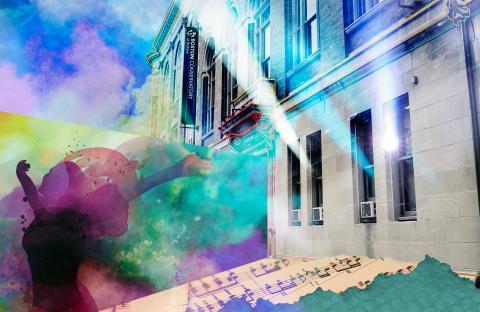The Boston Conservatory Method: Cultivating Creativity and Fearless Learning
At Boston Conservatory at Berklee, we are radically redefining the vision of what a conservatory education can be, with one primary goal in mind: to help our students cultivate key future-proof skills that equip them to not only survive but thrive in the fast-changing career landscape they will navigate.

Higher education is in the midst of a reckoning on many fronts, with perhaps the central issue being the “value proposition” of post-secondary education itself. Rising tuition costs and crippling student debt have brought to the forefront crucial questions about the value and purpose of higher education, most specifically how—and whether—the significant financial investment in a post-secondary education truly prepares students for successful, meaningful, and productive careers and lives.
As research about the future of work has made clear, this generation of students (and those to follow) will likely change jobs and careers many times over the course of their professional lives. Very few students in this generation will be able to follow the trajectory that was once an implicit promise of a college education: prepare for a specific career during your post-secondary education, enter that career with the credential of your undergraduate degree, and then move up the ladder in that career until you retire. It is clear that the careers of this generation will be defined by constant and large-scale change, and in order to thrive, young people will need their educational experience to equip them in new ways for the evolving challenges and opportunities they will face.
The key question for higher education, then, is: How do we best prepare our graduates for this new landscape?
The Art of Navigating Change
The response to this question often falls into two broad categories. The first is that higher education should provide students with specific career skills, expertise, and experiences so they can move seamlessly from their education to their career of choice. Many students and their parents are seeking this kind of pragmatic, career-focused education, as indicated by the great numbers of students studying, for example, computer programming or nursing or elementary education. But this approach is challenged by the growing awareness that even fields that seem like “sure bets” can quickly be disrupted and undergo rapid and large-scale change, as COVID-19 has certainly demonstrated.
The second approach is to prepare our students with essential skills that are applicable and valuable across many disciplines and go “deeper” than content expertise or mastery. This is what a traditional liberal arts education accomplishes so well. Although a student who chooses to major in history or psychology may or may not draw on the specific academic knowledge of that field during their career, it is understood that they will be equipped for success because of the many transferable skills that a liberal arts education imparts, such as critical thinking, analytical skills, written and verbal communication skills, and problem solving.
In the past, conservatory education was usually considered to be a great example of the first category: a highly skills-focused education aimed at preparing students for a narrowly defined career path—a musician with a symphony orchestra, a stage actor, a concert dancer with an established company, and so on. At Boston Conservatory at Berklee, we are challenging this assumption by radically redefining the vision of what a conservatory education can be, with one primary goal in mind: to help our students cultivate key future-proof skills that equip them to not only survive but thrive in the fast-changing career landscape they will navigate.
Future-Proof Skills
To accomplish this, Boston Conservatory has developed a unique educational approach called the Boston Conservatory at Berklee (BCB) Method. The BCB Method, which is a structure both for curriculum and for pedagogy, is built around four modalities that create a transformational educational and artistic journey for our students: immersion, deconstruction, integration, and identity.
The BCB Method delivers the best outcomes of both a broad liberal arts education and a skills-focused conservatory education, while equipping our students with the future-proof skills that will be essential to navigating their futures.
What are these key future-proof skills?
First is the skill—notice I do not say talent—of creativity, which is arguably the most valuable currency of the future. The BCB Method is designed to nurture and develop curiosity, imagination, innovation, and problem solving and to give students the tools, methodologies, and confidence to meaningfully question established norms and harness their own creativity.
Second is the skill of learning—the ability to continually learn new information with both speed and depth; to interrogate new paradigms, value structures, and content areas; to integrate and synthesize information across disciplines; to collaborate with others whose expertise and knowledge differs from your own; and, most importantly, to embrace a mindset of continual growth and learning.
Immersion, Deconstruction, Integration, and Identity
We teach these skills through the four modalities that make up the BCB Method—immersion, deconstruction, integration, and identity—and through curricular structures and pedagogical approaches built around these modalities. Additionally, as an arts education institution, Boston Conservatory is uniquely positioned to shape our curriculum around a deep intertwining of experiential and academic learning, which we believe best supports the BCB Method and the key future-proof skills we aim to impart.
Here’s a look at how these four modalities shape our curriculum, pedagogy, and, most importantly, the learning outcomes of our students.
Immersion is an intensive, focused, rigorous study of a particular subject area or discipline; it’s a hallmark of conservatory education and one of the reasons many students choose this type of education. Immersion exposes students to a breadth and depth of knowledge and experience while encouraging intellectual curiosity and passion. This is a requisite for developing advanced, high-level skills. For example, a Conservatory dance student will take approximately six hours per day of experiential studio dance classes.
Deconstruction involves the questioning and contextualization of both received knowledge and foundational belief systems and structures. This opens students to new possibilities and approaches. Deconstruction is central to the development of analytical skills, critical thinking, creative problem solving, and innovation.
Integration develops a sense of empowerment and agency in our students; it encourages them to make connections between areas of inquiry, to synthesize information across disciplines, and to develop an informed perspective supported by depth of knowledge and examination. Integration gives students the tools to embrace ambiguity and move away from the false comfort of binary thinking. It enables them to celebrate and engage with complexity, plurality, and all the possibilities that these engender.
Identity engages students in asking: How do your experiences, your knowledge, your skills, and your values shape who you are as a person and the ways in which you aim to navigate, impact, and express yourself to the world? Who are you, and who do you aspire to become? How can you become the fullest version of yourself?
Actualizing the Future Our Students Imagine
As the incredible global challenges of the last two years in particular have made abundantly clear, our world needs problem solvers who possess the creativity, empathetic imagination, and sense of purpose to change the world for the better. With the BCB Method, Boston Conservatory at Berklee aims to graduate students who possess a highly developed and honed skill set in the artistic discipline of their choice, the critical-thinking, analysis, communication, and problem-solving capabilities that are the hallmarks of excellent liberal arts education, and the key future-proof skills of creativity and fearless learning.
What is the value proposition of higher education? The value proposition of Boston Conservatory at Berklee is that our graduates will have the appetite to embrace change and respond to an evolving career landscape with flexibility, creativity, fortitude, and resilience—to create the lives they aspire to live and actualize the future they imagine.
READ: STAGES Winter 2021

"The Boston Conservatory Method: Cultivating Creativity and Fearless Learning" first appeared in the Winter 2021 issue of STAGES, Boston Conservatory's institutional magazine.
